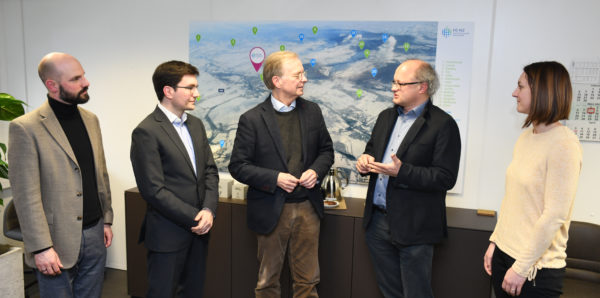Prof. Andreas Peschel has his first few days of work behind him. The new subinstitute director at Forschungszentrum Jülich’s Institute for a Sustainable Hydrogen Economy (INW) has started putting his team together. Right at the outset, both Peschel and INW played host to an important guest. Thomas Rachel (CDU), Member of the German Bundestag for the district of Düren, welcomed Peschel to his new role and visited the institute.
Andreas Peschel Begins Work
Rachel was Parliamentary State Secretary in the Federal Ministry of Education and Research for 16 years, holding the position until 2022. For many years, he has been an important supporter of the notion that Forschungszentrum Jülich will play a leading role in structural change in the Rhenish mining area. This is one of the reasons behind the Helmholtz Cluster for a Sustainable and Infrastructure-Compatible Hydrogen Economy (HC-H2), of which INW forms the core, aiming to demonstrate innovative hydrogen technologies with other partners in the Rhenish mining area.
“You are one of the pioneers of our cluster. It is in part thanks to your commitment that we have been given this crucial opportunity here in the Rhenish mining area,” Prof. Peter Wasserscheid, HC-H2 spokesperson, said to Thomas Rachel. The German Federal Ministry of Education and Research is providing HC-H2 with € 860 million in funding up until 2038.
“This is why in welcoming Andreas Peschel, we are welcoming another pioneer of a sustainable hydrogen economy to the Rhenish mining area and to us in the district of Düren.”
Thomas Rachel, Member of the German Bundestag
“Climate change caused by human activity is the biggest challenge we all face in the 21st century. We need the smartest minds,” said Rachel. “This is why in welcoming Andreas Peschel, we are welcoming another pioneer of a sustainable hydrogen economy to the Rhenish mining area and to us in the district of Düren.” As head of chemical technology development at Linde Engineering, Peschel has already worked at an important interface, namely the transfer of innovative, environmentally friendly hydrogen storage technologies to the market. “If we can play a pioneering role in our region, then we will also help to create new jobs in the energy system of the future,” Rachel added.
“The best conditions”
And this is precisely what Andreas Peschel sees as an important part of his job. “We have a lot of work to do. But we can achieve a great deal here in the Rhenish mining area because we have the best conditions,” said the 40-year-old, who has headed the subinstitute Process and Plant Engineering for Chemical Hydrogen Storage (INW-4) since 1 March. Andreas Peschel simultaneously assumed a W3 professorship at the Faculty of Mechanical Engineering of RWTH Aachen University for the Department of Process and Plant Engineering for Chemical Hydrogen Storage and is a member of the Aachener Verfahrenstechnik (AVT; Aachen Chemical Engineering) chair consortium.
“I realized within the first few days that we have an enthusiastic team ready to tackle the major tasks of structural change and the energy transition. You can see something growing here almost every day.”
Prof. Andreas Peschel
Before Peschel can devote himself to his main task – the development of innovative technologies for chemical hydrogen storage – he first needs to put his team together at the institute. “I realized within the first few days that we have an enthusiastic team ready to tackle the major tasks of structural change and the energy transition. You can see something growing here almost every day. Once the development of infrastructure has progressed further, we aim to begin our research next year, which we then want to bring to market maturity stage as quickly as possible together with our partners.”
Rachel promised to pay further visits to HC-H2 and INW in future. “I’m very excited about the growth and results that will be achieved here in Brainergy Park. Both you and your team play a central role in the district of Düren and beyond when it comes to creating new economic power as a counterweight to the phasing out of lignite. New, future-proof jobs provide the best conditions for achieving this goal.”

Arranging to meet again: Member of the German Bundestag Thomas Rachel (centre) plans to visit (from left to right) hydrogen network leader Fabian Patzak, director Prof. Andreas Peschel, founding director Peter Wasserscheid, and department head Dr. Susanne Spörler more often. Photo: Guido Barth


